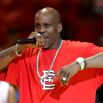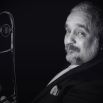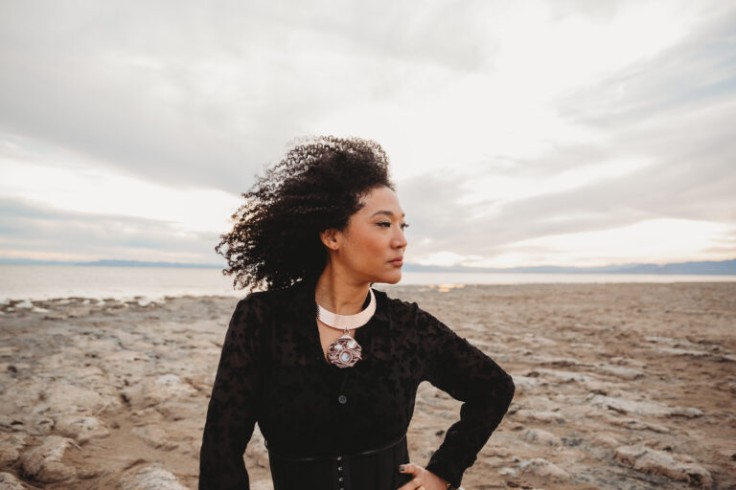
"Give me chaos and give me pain, but you can never kill my flame," Judith Hill proclaims on her audaciously titled new album, Letters From a Black Widow. And the singer-songwriter and dynamite vocalist has certainly endured her unfair share of chaos and pain during in her 39 years. But as Hill sings on another track, "bad times make strong women." And with Letters From a Black Widow, this soul survivor has made the baddest and strongest album of her unusual career.
A bit of harrowing background, here: In 2009, before competing on The Voice or appearing in the Oscar- and Grammy-winning documentary 20 Feet From Stardom, Hill was set to duet with Michael Jackson at his This Is It farewell concerts in London. But then Jackson died suddenly, less than three weeks before his O2 Arena residency's premiere date, and Hill ended up singing "Heal the World" at his globally televised memorial service instead. Hill later found a mentor in another legend, Prince, who produced her debut album, but she experienced an even more devastating loss when Prince also died in 2016. Six days before Prince's death, Hill had actually been with him on his Atlanta flight when it made an emergency landing after he fell unconscious.
The grief and shock alone would have been debilitating enough, but Hill also had to contend with internet trolls — and unfortunately, she still does — who cruelly blamed her for both artists' deaths and accused her of being a "Black Widow" who curses anyone she works with. And in her ambitious new album's experimental central theater-piece, she confronts all those rumors and conspiracy theories that "Black Widow killed MJ and Prince" — and finally takes back her power. "That's not my name," she asserts on "Black Widow," as she sheds the "scarlet letter on my back" for good. "Don't call me that."
Letters From a Black Widow is a bold and brave statement, written, arranged, and produced solely by Hill. Hill also provided much of the instrumentation (including electric guitar, which she taught herself to play during the COVID-19 pandemic), along with her family bandmates: her keyboardist mother Michiko Hill, who recently beat cancer, and bassist father Robert "Peewee" Hill, both Sly Stone associates. Elsewhere on the autobiographical rock 'n' soul song cycle, which opens with a mushroom trip that sets her self-exploratory sonic journey into motion, Hill examines the trauma of her religious and perfectionistic childhood, her yearning to be a mother herself, and her fears that she sacrificed too much for her career. "After [working with Jackson and Prince], my name is always tied to them, and that's been hard for me," she admits to Music Times. Like, 'OK, what can I do to get past that?' I think this album is part of me reclaiming my story, reclaiming my name, and stepping out of that."
Below, in a Music Times Q&A that's as candid and eloquent as her lyrics, Hill opens up about grief, mental health, fame, the dark side of social media, psychedelic mushrooms, Christianity, misogyny, motherhood, ageism, and why, as she declares in the track "Flame," she will never stop making music.
All right, there is so much to unpack here. The album title alone! Or the line in the song "Black Widow," when it says, "Black Widow killed MJ and Prince" — I literally gasped, out loud, when I heard that. What made you want to really go there?
JUDITH HILL: I was experiencing a lot of hate-trolling, people just saying, "Oh, she's cursed!" Or, "Stay away from Stevie Wonder!" That sort of thing. Just people just being ignorant and basically accusing me of having something to do with any of it, which was really heartbreaking for me and really hurtful. It put me into a real depression for a while, because I was very sensitive and it was very triggering. I went to counseling for it for years and was too afraid to even mention it and was hoping that it would just go away. And it was really not going away. My counselor was like, "I think you should write about it just for yourself, just to give a place for it so that you can express yourself." And so, it first became sort of an exercise, a counseling exercise. And when I did it, it was a very liberating experience because I realized, "Oh, I'd muted myself." It was scary, but also very, very freeing. Giving myself permission to do that was very, very powerful. From there, I was able to write the whole album and take the journey — starting with [track 1] "One of the Bad Ones," which came from a mushroom trip when I was with my friends.
You've gotta tell me about that!
It was supposed to be just a fun social trip at a hot springs near Joshua Tree, but I had more of a spiritual trip. All of a sudden I started to hallucinate, and the first thing I saw was a mountain in front of me. It was a mountain of pain. And I realized, "Oh, even though I've done all this therapy, I'm not free from this." It was a big, tall mountain, just debris and garbage, and it [symbolized] all the baggage I was carrying. It was so powerful for me to acknowledge: "This is too big for you. You've been trying so hard to get rid of this mountain, but it wasn't intended for you to get rid of. Stop trying so hard. Just acknowledge that there is this trauma in your life. Don't run from it." That was a very powerful trip for me, and I stayed in that space all night; while the others were partying and prancing around, I was having this spiritual awakening or whatever.
It quite frankly pisses me off that you had these trolls — that instead of people having empathy that you'd experienced two huge losses at key moments in your career, only a few years apart, they blamed you. Were you surprised by that vitriol? Did that throw you?
Oh, it threw me. I was really angry about it, and it also threw me off totally off into this depression. ... It was constant, an onslaught of social-media messaging and hate. It was a very big thing that was happening to me and I internalized it, which what made it so poisonous, and why it almost made me paranoid. I was walking around thinking that the world was against me. It really turned into this mental health crisis. ... That's what really this album is about: uncovering shame and triggers and deeply rooted things that we've said about ourselves, and why something that someone else says can so deeply affect us. It's because we've already said that to ourselves — that "you're no good" or "you are bad." If someone's calling you a "Black Widow" or saying you are cursed, that can really be traumatic and triggering to someone who's already not thinking highly of themselves. It really opened my eyes to a lot about myself and took me on a real journey.
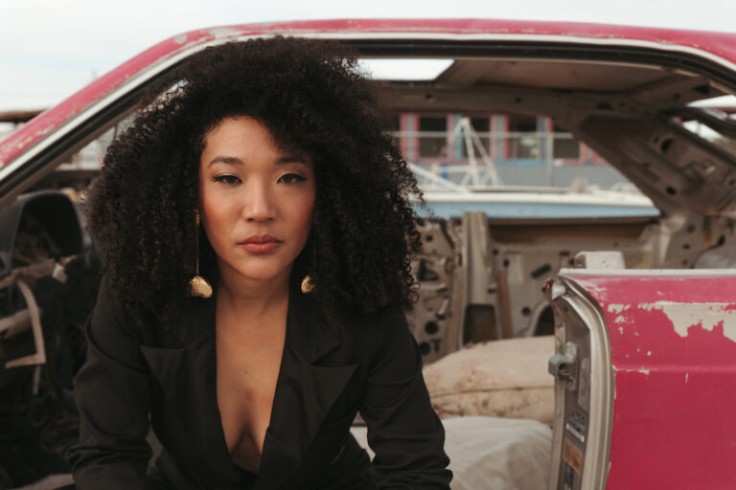
Wasn't it some tabloid that originally called you a "Black Widow"?
Well, TMZ certainly did propel it when they released that article with a photo of me in between Michael and Prince, saying, "The same girl that was singing with Michael was with Prince before he died!" All hell broke loose after TMZ released that.
Were there low moments when you kind of believed what the tabloids and trolls were saying about you? There's a line in "Black Widow" where you sing, "Maybe it's true/Don't get too close, I'm bad juju"...
That's a great question. I don't think I ever felt like I was cursed or that necessarily something was wrong with me. But I grew up in a very religious world and was constantly told, "If you do something wrong, you're going to hell." As a 4th-grader, I stopped eating and went through a real crisis and they had to get three or four counselors, because I was just terrified of going to hell and things like that. So, I think it might've come from that, where I was terrified of doing something bad and thinking, "Well, I'm probably going to hell because I did this or that," counting the list of what I've done bad, like Santa's list or whatever. It was an early childhood thing. It was more core-level stuff about being a good person. That's something I really internalized as a kid.
Are you religious now?
Yes, I'm still a Christian, but my journey with my faith has evolved so much to where I know how to separate out the nonsense and the institution and all of the manipulation, and still have a very more genuine, personal relationship with God that is centered on what I know to be true and what I've experienced now. But it did take a while to separate those two.
Prince was famously religious. Is this stuff you guys bonded over or discussed?
We talked about it a lot, yeah. He was very spiritual, very religious, and we'd have conversations about God all the time. But we didn't really talk more about the punitive stuff. He was more fascinated by the origin, the narrative doctrine, Egypt, Africa. We never really talked about punitive damages of, "If you do this, this bad thing happens."
Was there any part of you, from your childhood trauma, that thought you were being punished in some way, or that you had somehow brought these tragedies about? Or did you feel guilt that you didn't stop tragedy from happening?
There were moments when I was like, "If I could just rewind time..." I wish I knew what we learned, what we know now, about what [Prince] was going through. I wish I knew that. ... I never would've suspected that he was doing anything like that. He was very healthy. He was healthy eater. I mean, his regimen of the lifestyle was very, very healthy. So, that was a shock to me.
Going back to that emergency landing on the plane, I don't know how much you knew at that time about Prince's situation...
I didn't know anything until we saw him [pass out on the plane] and I was like, "Oh my God!" Then later on, discovering that there were pills and things like that, I had no idea that he was even doing that stuff. So, it was very much traumatic to be in that experience.
It's so unsettling and tragic that both Prince and Michael died because they were taking prescription drugs to push themselves in order to get past pain and perform. It's becoming an increasingly common tragic story; Tom Petty also comes to mind. As a constantly touring and working artist yourself, how did that knowledge affect you?
It was really eye-opening, realizing how emotionally isolating it can be to be an artist and how there's not much of a support out there. That's why I love organizations like Backline that are actually really making an effort to provide mental health support to touring artists. We're taught as artists to be powerful and strong and keep the magic going, and there's never really a chance for any humanity. There's been more discussion about mental health now, artists speaking about it more, which I think is fantastic. I'm the biggest advocate for that, just given my circumstances of what I've gone through, seeing the great heroes fall. I think they felt they had to be above humanity, and be perfect, and that's heartbreaking. It's very important, no matter how big of an artist you are, to make sure you're getting mental health support.
When you were going through all this, did you have the support you needed, or did you feel isolated?
I had a lot of people reaching out and providing as much support as possible, which is just part of grieving and losing someone. ... I think it became a more complex journey once this trolling started, and I felt I wasn't really allowed to grieve [Prince] anymore. I was dealing with that, and it became more complicated.
Did you consider quitting music, or pausing to retreat from the public eye for a while? From what I recall, you never did stop working.
I never considered stopping, ever. I think it would be impossible for me to stop. I've actually never stopped. Maybe there are times where I'm frustrated with the business side of things, but making music and performing is just part of me.
The business stuff is interesting. Obviously you've had a career that most people would envy. You've worked with so many greats. You were on The Voice. You've won a Grammy. You were in an Oscar-winning film. You've performed around the world. But there are people who probably think you should be an even bigger star and wonder why you're not. You might even wonder that yourself sometimes.
Yeah, it's an interesting thing... I feel like a "success story" that I'm able to write music and perform it in front of people who love it. For me, that's a form of success. But yeah, we live in a world where something's wrong unless you are playing Madison Square Garden. It's like, "Oh well, sorry, you're not there yet." I feel really happy about what I'm doing. I think my story is a bit unique. I think I was prematurely thrown into the limelight with This Is It and 20 Feet after sort of just being a background singer. All of a sudden, everyone knew me. That was hard to navigate through. I was just a background singer, and then I was in a more celebrity-driven world than artist-driven.
I seem to recall you had some offers and opportunities right after singing at Michael Jackson's Staples Center funeral, but you passed on them because it didn't feel right.
Yeah, and then there's been things I have gotten into that weren't the right fit, but I did it anyways! The deal with Sony — that ended up being a huge lawsuit and the craziness that wasn't right. I probably shouldn't have done that. But you live and you learn. I think all those experiences make me who I am today, and I'm much better at discerning what feels right for me than I was 10 or 15 years ago.
The Sony thing — is that when Prince surprise-dropped your debut album, Back in Time?
Yeah, that was a big mess, and that's a whole story in itself! That was a lawsuit. That was Prince and I's record that [Sony] did not want to release because they were hoping for another album, but they were sort of shelving me and holding it hostage. Long story short, that was a mess.
This week, the week that Letters From a Black Widow drops, marks the eighth anniversary of Prince's death. I would assume that eight years later, most of the social media hate and trolling has subsided...
No, no. Absolutely not.
What? Really?
It just continues. It's really, really amazing. It's a stigma that hasn't stopped. It's been very tormenting for so long, and it's just something I have to live with. But that's why it's also very liberating to finally write this music and be like, "Yo, this is actually me clapping back" and being like, "Oh, this is what you guys are saying and this is how it's making me feel." Which is wild. I would've been terrified to do this five years ago. It was still too raw. But at this point, I think I'm a little bit more removed from it. I'm still being trolled, but I'm having more strength to say something.
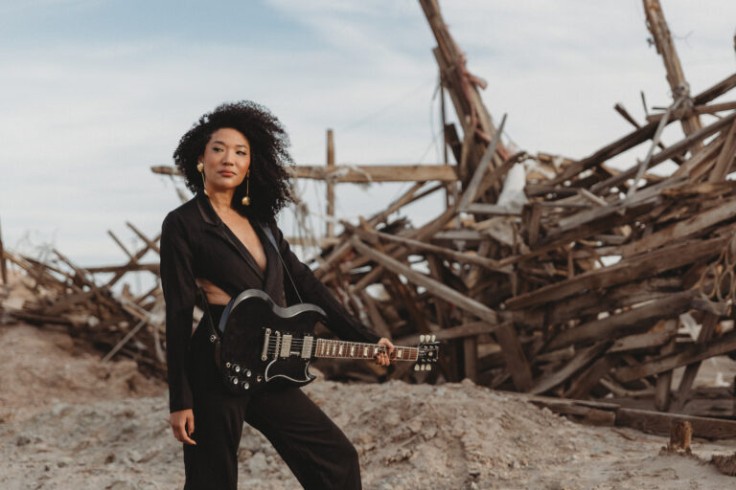
Wow. I had 100 percent expected you to tell me the trolling had died down, or even that some people had apologized for it.
Oh, no, there's definitely been no apologies. Maybe after this record there will be some. But I would expect that there would also be more trouble. Some people just need someone to blame. They need that. There's very little actual thinking that's going on with these people.
You said five years ago you would've been terrified to put out a record like this. Are you scared now that it could re-stoke some of the trolls' flames?
Yes. I am scared. But every time I think about it, it's like, why shouldn't I release it? Because I'm scared? Is that a good reason to not release it? No. It's my truth. And I think it can be empowering to a lot of people that are [in a tough situation] because it's liberating. There are so many more reasons to release it. And I don't want to live in fear. I think this is a big step towards me overcoming that fear-based living. This muzzled me for so long. I want to walk in freedom and live my truth.
There's so much misogyny at the core of all this "fan" hate. I know this is not the exact same situation, but I think about how 30 years later, Courtney Love is still being blamed for Kurt Cobain's death...
Yeah, those things are hard to shake. They're sort of imprinted, especially when it comes to a very prominent male figure. Good luck trying to get rid of that. That's a whole other conversation about prominent male figures and the women that are affiliated with them. ... Like, I can list off so many male musicians that were very close to Michael and Prince and worked with them far more than I ever worked with them, knew them more deeply, and yet, they're not getting accused. It's very misogynist. ... I think it has to do with power. It's historically this idea of a powerful man and then the women clinging to that to get whatever they can from it. It's this idea that the woman must have poor intentions, just because she is less powerful. ... The one that has less power is always considered a user or out to get something, because people can't ever comprehend the idea of mutual collaboration or the coming-together of minds, regardless of money. People see everything in terms of money and power. We live in a very capitalistic-driven world. It's like everyone's seeking out money, power, and fame, and that's all they can see. They can't comprehend any sort of other dynamic.
Did making Letters From a Black Widow bring any closure for you?
Yeah, but for me, this record is about so much more than just [Prince or Jackson]. It's really about me grappling with shame. It's an autobiographical story for me, dealing with my own demons. I feel that's so much more important to talk about. And as an artist, I want to create art that allows other people to explore deeper emotions. Not every song has to be about partying and dancing, but we can still create funk music, soul music, that explores deeper themes. I want to do that for my audience and for myself. I don't think this will be the last time I explore deeper issues, because that's essentially who I am as an artist. But yeah, I think that addressing [the social media backlash] was a big step for me. And I finally did it.
Sorry if this is a strange question, but what do you think Prince would think of this record?
That's a great question. I mean, I can't even imagine how he would feel about all the trolling that's happened. But I do remember having conversations with him about trolling, and he had had a different approach to it. He was a little thicker-skinned than me! I would be really bothered [about some comment or tweet], and he'd be like, "Well, they're talking about you, right? Put out another song!" His relationship with it was more like, give the middle finger and get back out there. I'm a little more sensitive about it. ... And I'm still very sensitive, but this is my first time of being like, "You know what? I'm just going to stand on my truth." It is a little bit of my middle finger, yeah.
What did you learn about yourself when making this album, in terms of your resilience? On the track "Dame de la Lumiere" there's a key line: "Bad times make strong women." I'm thinking that needs to be on your T-shirts and merch.
Ha, yes, totally. I've realized I'm a lot stronger than I thought I was. And really, that is the takeaway. That is the thesis of the album: Bad times make strong women. In "Dame de la Lumiere," we are celebrating all the women in my lineage, powerful women who have overcome so much, and letting that be a message to every other woman out there who may be afraid to speak up or feel muted or like they don't have power. Just saying: "You're a badass. You're going to be fine."
I do think it's a powerful coming-of-age album that speaks to where I'm at now. I'm older now, and sometimes we don't hear songs coming from that. Pop music is all very youth-driven. I love this record because it's a chance for me to talk about motherhood, a chance for me to talk about the sacrifices I've made as a single woman, as a career woman. It's like, "Do I freeze my eggs?" These are the real questions that I have to ask myself. There's a biological clock. And I've always chosen this road, which I love, but also I have a song on there called "Let Me Be Your Mother," which is asking permission to be someone's mother. At this point, I am saying, "I promise you can trust me" to the kid. "I promise I've gotten all the mistakes out of my system and you can trust me to enter this world." There's a lot of themes in the album that speak to just being a woman, and being a career woman, navigating power and navigating all these things.
"Runaway Train" addresses this too. Do you ever regret the path you took, prioritizing music and being on the road, and putting other things on the back burner?
Sometimes I regret that I didn't get married earlier. I do think that it would've been nice to have a support and a family at this point in my life. So, actually, I'll be honest: I do regret that. I feel like now it's a lot harder. I'm also an introvert, so it's hard to meet people. It just becomes harder and harder.
It's also an ageist business. You've been doing this for a while and you've had success, but now, as you near 40, is there any panic or concern about being aged out of the youth-obsessed music industry?
I think that that's a great question, because I have that anxiety a lot. But I also feel really militant about being the antithesis to that ageism. I want to be somebody that you see in their seventies killing it and singing the blues. I want to show that to people, to young artists, because we're all being programmed to believe that the only justification to a career in music is fame and celebrity — and if you don't have that, then you don't have the legs to be an artist. And I think that's a very poisonous message.
It's odd to me that you went on The Voice, then, because talent shows like that are all about selling the dream of overnight stardom and success, and how that dream will come true if you can just win a record deal or get on television.
Well, that was about 10 years ago, and yeah, 10 years ago I was sort of chasing the system. And I did have hopes that the system would support me. But then working with Prince changed that, because he told me: "You don't need the system. I'm going to show you what it looks like to not be in the system, to be so autonomous and so clear about what you want to do that they will never be able to age you out or stop you — as long as you decide that you don't need what they have. If you can get to that point, you can go on forever." And that's one of the biggest, if not the biggest, lesson he taught me. So, yes, I was chasing the system 10 years ago. But then I realized: I will always be doing this, regardless of the system.
This interview has been edited for brevity and clarity.
© 2026 MusicTimes.com All rights reserved. Do not reproduce without permission.
